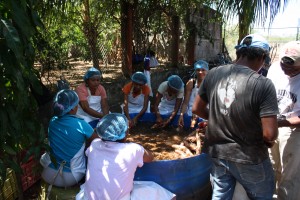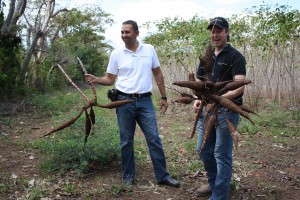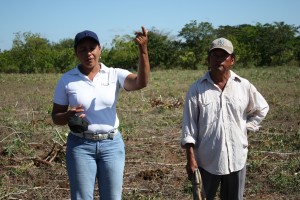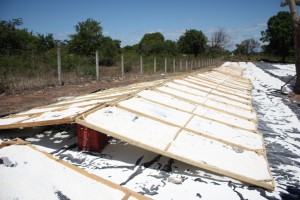Partnering with Nicaraguan Yucca Farmers to Increase Their Profits
A pungent, unfamiliar, almost rancid but still sweet, scent hit my nostrils: freshly ground yucca meets a growling grinder. Five men man the contraption: one filling the large funnel, one jamming a large stick into the funnel to feed the yucca chunks into the grinder, one scooping the pulp out of the bottom, one shoveling the pulp into a sack, and one, well, doing a great job holding the sack. I’ve eaten yucca fries and mashed yucca, but this is not a culinary operation.
 Stuffed-full sacks of yucca pulp are put into a compressor that squeezes the water out. Fifty already-smashed sacks are piled in the corner, contents ready to be emptied onto large black tarps to dry in the midday sun. An acre of field behind the plant is dedicated to rows of tarp. Some rows have wood framed screens propped up to allow breeze to flow above and below the pulp to speed up drying. The air is sweeter and less musty in the field, but still tangy and fermented.
Stuffed-full sacks of yucca pulp are put into a compressor that squeezes the water out. Fifty already-smashed sacks are piled in the corner, contents ready to be emptied onto large black tarps to dry in the midday sun. An acre of field behind the plant is dedicated to rows of tarp. Some rows have wood framed screens propped up to allow breeze to flow above and below the pulp to speed up drying. The air is sweeter and less musty in the field, but still tangy and fermented.
A diesel motor catches my attention as a yellow truck pulls into the gate in front of the Opportunity Nicaragua plant. Fifty young women chatting in the shade of nearby trees make their way to a tented slab of concrete at the sound of the truck. They sit on orange crates in slightly haphazard circles, waiting for young men to deliver their truckload of yucca, pulled from the ground early this morning. The women peel the yucca efficiently and skillfully, each filling their own orange crate. Opportunity International pays the women by the weight of the crate at the end of an eight-hour shift. At talk of buying a yucca peeling machine, the women protest saying they like the work. Most households in the area are multi-generational with one to two family members working part-time. These women are thrilled to have steady work for good wages. Day workers are organized into teams of five. Opportunity staff communicates hours and days with a team leader who then gathers up the team on work days.
 Young men carry the crates of peeled yucca to the side yard where big blue plastic tubs of water wait encircled by more women donning white aprons. The women give the yucca a quick wash and scrub before passing them on to the five men at the grinder. It’s a very well-orchestrated operation. And it’s all designed to help 300 farmers get the best margin from their yucca harvest.
Young men carry the crates of peeled yucca to the side yard where big blue plastic tubs of water wait encircled by more women donning white aprons. The women give the yucca a quick wash and scrub before passing them on to the five men at the grinder. It’s a very well-orchestrated operation. And it’s all designed to help 300 farmers get the best margin from their yucca harvest.
The “gold” of the yucca plant is the starch that can be derived from its ugly, brown, tubular roots. Watching 50 people take one farmer’s yucca harvest from ground to starch makes obvious the need for cooperation and mechanization. Yucca is a cranky crop. Its roots are extremely impatient and begin to rot just 24 hours after being pulled from the ground. There are a few ways to extend the life of a harvested yucca: dipping it in wax, which requires a waxing tub; keeping it cool, which requires refrigeration; or peeling, washing, grinding, pressing and drying, which requires the lengthy process described above.
Yucca also suffers from class discrimination, and class or quality can vary greatly from plant to plant, and even within a plant. A-quality yucca is suitable for wax-dipping and sale in the market. B-yucca is best suited for starch and flour processing. C-quality yucca can really only be sold for farm feed. Each quality fetches a different price. The more A yucca in a field, the more money the farmer can earn… if he can sell and deliver before it begins to rot.
Impoverished farmers living hand-to-mouth have little chance of selling A, B, or C yucca for a profit. There are too many barriers. As such, they end up as price takers in a precarious market. Enter Opportunity Nicaragua’s processing plant.
Opportunity sends out agronomists like Helen and Hawell to partner with farmers in the region. They teach techniques to increase yield, such as planting yucca seeds horizontally in softened earth rather than vertically in unturned soil. At harvest time, Helen and Hawell take a sampling of yucca from a 10-meter by 10-meter plot to assess the average quality of the harvest. Opportunity buys the farmer’s entire yield at current market price based on the assessment. An Opportunity truck arrives at the farmer’s land on the day of harvest to quickly take the yucca directly to the plant for processing. Because the farmer is able to sell his whole crop at a fair price without waste or spoiling, he increases his income significantly and can plan for the upcoming seasons.
 “Successful farming is all about mitigating risk,” says David Kone, executive director of Opportunity Nicaragua. When farmers can count on a buyer and a fair price for their best yucca, they can invest in their homes and land, build savings, and send their children to school.
“Successful farming is all about mitigating risk,” says David Kone, executive director of Opportunity Nicaragua. When farmers can count on a buyer and a fair price for their best yucca, they can invest in their homes and land, build savings, and send their children to school.
Carlos Polanco, an Opportunity farmer, shared how he decided to work with Opportunity. His brother’s plot of land abuts his own. Last year his brother worked with Opportunity agronomists but Carlos was skeptical. The techniques Helen and Hawell teach require more labor on the front end, so without proof of higher yields, it can be hard to convince life-long farmers to adapt their methods. But as the yucca grew it became obvious that the labor was worth it: his brother’s yucca plants were noticeably fuller. At harvest, each plant yielded two to three times more yucca that was better quality than his own. This year, Carlos is an Opportunity farmer.
 Back at the processing plant, David chats with plant manager Denis Brenes. Nicaraguan-born Denis has been integral to the project’s success in the last 11 months. Last week, David and Denis received a game-changing call. Cargill in Nicaragua tested and approved Opportunity’s starch product for use in their animal feed and will buy as much starch/flour as Denis can process in 2012. With proper machinery to unlock some bottlenecks in processing—such as the sun-drying process—Opportunity will be able to buy yucca from 1,000 farmers this season.
Back at the processing plant, David chats with plant manager Denis Brenes. Nicaraguan-born Denis has been integral to the project’s success in the last 11 months. Last week, David and Denis received a game-changing call. Cargill in Nicaragua tested and approved Opportunity’s starch product for use in their animal feed and will buy as much starch/flour as Denis can process in 2012. With proper machinery to unlock some bottlenecks in processing—such as the sun-drying process—Opportunity will be able to buy yucca from 1,000 farmers this season.
Helping people to improve the economics around their community’s greatest assets is called Asset-Based Community Development. Opportunity Nicaragua’s pilot project is focused on improving efficiency and quality in the area’s agriculture, tourism and artisan markets to increase the income and resources of the community. The goal is to turn self-sustainable assets, like the yucca-processing plant, over to the community of farmers in the next decade.